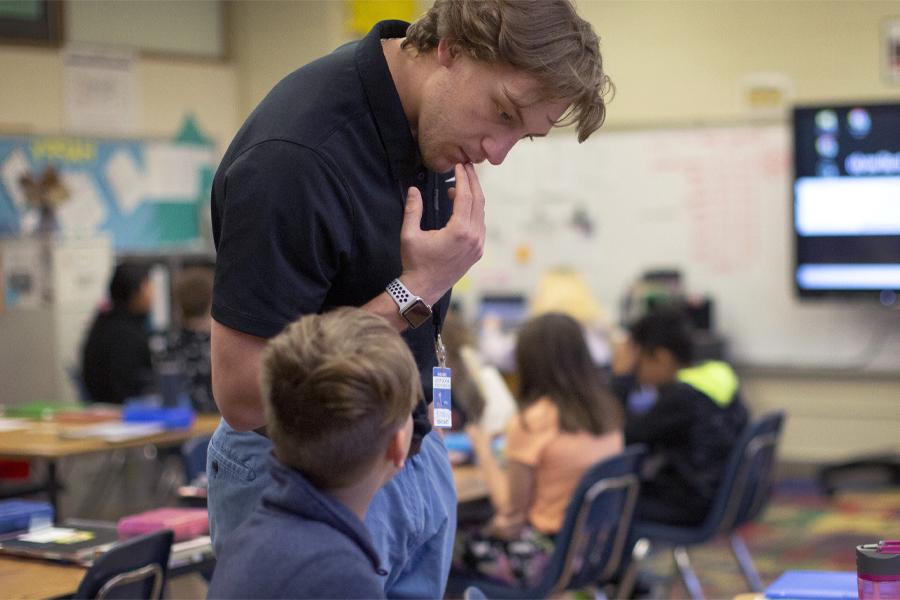EARLY CHILDHOOD EDUCATION
Bachelor’s Degree Program
Communities everywhere have a critical need for highly trained early childhood educators and childcare professionals. Today’s education profession also demands the ability to teach in inclusive settings.
In response to these needs, the University of Wisconsin-Whitewater offers dual licensure in Early Childhood Education and Early Childhood Special Education. Our blended program is the first of its kind in the UW System.
What can you do with an Early Childhood Education degree?
This bachelor’s degree program will prepare you to work with children from birth through age 8. More specifically, you’ll be qualified to apply for a license through the Wisconsin Department of Public Instruction to teach regular and special education at the early childhood development level. You’ll be prepared to teach in community childcare facilities, birth-to-three programs, Head Start, preschool, 4- and 5-year-old kindergarten, and grades one through three in public and private elementary schools.
CAN WE BRAG A LITTLE?
Why study Early Childhood Education at 欧洲杯投注?
We might seem like a large university, but our program size is just right. When you major in Early Childhood Education at 欧洲杯投注, you’ll be part of a cohort. This means you’ll move through the program with the same group of peers, allowing you the chance to build relationships and a solid support network.
Here are a few other advantages to earning your degree in Early Childhood Education at 欧洲杯投注:
-
Expand your knowledge with courses focused on assessment; social emotional development; and identity, culture and social justice
-
Access an Early Childhood Education resource room with teaching supplies
-
Collaborate with a dedicated librarian who specializes in education
-
Explore the library’s robust curriculum collection, complete with innovative games, technologies and books
-
Participate in team-building programs each semester of the program
What our Early Childhood Education students do
Field study and student teaching

Early Childhood Education majors at 欧洲杯投注 engage in hands-on experience, from observing local Head Start classrooms to applying everything you’ve learned as a student teacher.
Field study and longer directed teaching placements — with all age levels and in multiple environments — during your first five semesters prepare you for your final student teaching experience.
Each year, at our annual Project Showcase and Graduation Celebration, teacher candidates share their student teaching work and other accomplishments with their peers, families, friends, community, faculty and staff members.
Campus involvement
Early Childhood Education majors often join campus organizations such as:
CARE: Creative and Resourceful Educators
Advocates for the community of young children and their families through education, fundraising and service.
Best Buddies
As part of this national organization, our chapter matches college students with people with intellectual disabilities for one-on-one friendships.
Aspiring Educators of Wisconsin
Provides educational and social opportunities to future teachers, and is a branch of both the National Education Association and the Wisconsin Education Association Council.
Undergraduate Research Program
Apply your knowledge outside of the classroom, working alongside a mentor as a student researcher, or creating an independent, student-led project with a mentor's help.
Cross-cultural experiences
As an Early Childhood Education major, you have the chance to spend part of your student teaching semester abroad; recent students have traveled to Ecuador, Jamaica, Mexico and Sweden.
Our students also have the unique opportunity to study within Wisconsin’s Ojibwe community.
What our graduates do
Early Childhood Education jobs: Career success
Our graduates find success in a variety of Early Childhood Education careers, from leading classrooms to working with students one-on-one to running their own businesses.
Here are just a few typical jobs in Early Childhood Education:
- Child care/day care centers and programs in a variety of locations, formats, affiliations and types, including
- private
- nonprofit
- religious/faith-based
- corporate
- university/college lab
- employer-sponsored
- Preschools
- Elementary schools
- Home school settings
- Head Start programs
- Early Head Start programs
- County birth-to-three agencies
- Home visiting programs
- State or non-profit organizations focused on policy or adult education
Many of our graduates continue on to graduate school, such as earning a master’s degree in special education or education leadership.
Our Early Childhood Education Faculty
Since our program is interdisciplinary, you’ll work with faculty and staff members from both our Special Education and Curriculum and Instruction departments.
Our faculty and staff members have expertise and research interests in many areas, including:
- assessment
- evidence-based practices
- early intervention
- social-emotional development
- emotional/behavioral disorders
- literacy
- race, culture and identity in early childhood education
We are published authors, research mentors and principal investigators on past and new grant-funded projects.
Want to learn more about Early Childhood Education at the University of Wisconsin-Whitewater? Contact us »
欧洲杯投注 offers the following Early Childhood Education degrees:
The ECE program follows a structured 4.5 year plan that will prepare you for state licensure; this includes traditional coursework, field study and directed teaching. Here’s a small sample of classes you will take:
- Working With Children and Families in a Diverse Society
- Language Development and Disorders in Children
- Art in the Early Years
- Curriculum, Methods, & Materials for Children with Multiple Disabilities
- Medical Aspects of Disability
- Integrated Curriculum
- Leadership in Early Childhood Education
While you can declare Early Childhood Education as your major when you enter the school, you’ll need to be admitted to Professional Education separately. This requires:
- completion of 30 credits
- a GPA of at least 2.75 with the top 30 students, by GPA at time of application, admitted to the program
- passing all three pre-professional skills tests
- attending all required program meetings/orientation












